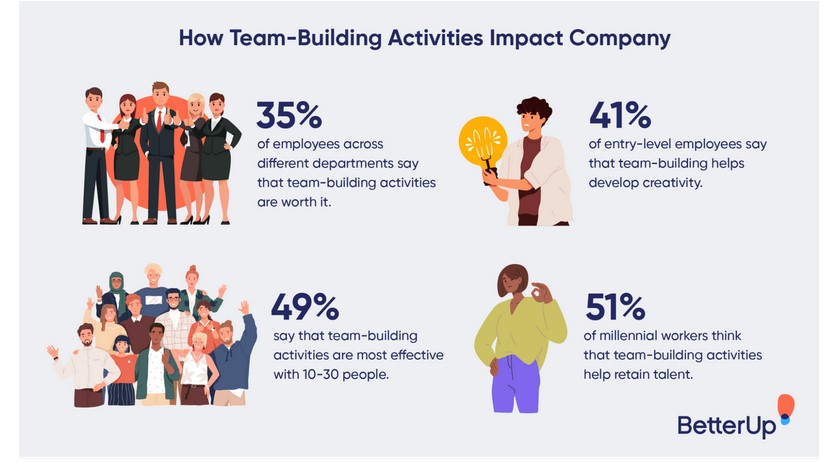If you are looking to reduce your company’s tax liability, team building activities can be a useful tool.
However, not all team building expenses are eligible for tax deductions. It’s essential to understand which expenses qualify so that you can maximize your tax benefits.
As we step into 2025, it’s crucial for businesses to stay informed about the latest tax deduction rules, especially concerning team building events and business meals.
The landscape of tax deductions has evolved significantly since the Consolidated Appropriations Act of 2021, impacting how businesses can claim deductions for these expenses.
By incorporating team building activities into your company culture, you can not only improve employee engagement and performance but also reduce your tax liabilities by taking advantage of various tax incentives and deductions.
Understanding the tax advantages of team building expenses can help you turn them into a strategic resource for the benefit of your business.
Key Takeaways:
- Team building activities can provide tax benefits for your business.
- Incorporating team building into your company culture can improve employee engagement and performance.
- Understanding tax incentives and deductions related to team building can help reduce your tax liabilities.
- Team building can be leveraged as a strategic resource for the growth of your business.
- By the end of this article, you will have a better understanding of how team building and taxes are interconnected in 2024.

employee-engagement-game-show-idea
Book a Live Interactive Game Show!
Call us today. TV Style Game Shows for groups are our specialty. Let's Play!
What’s Deductible in 2024?
While entertainment expenses, such as tickets to sports events or shows, remain non-deductible, there’s good news for businesses investing in team-building activities.
In 2023, expenses incurred for team-building outings, including ticket purchases for staff events, are fully deductible.
This is in line with the tax code’s provision that allows a 100% deduction for expenses related to recreational, social, or similar activities primarily for the benefit of employees.
Navigating Common Deduction Scenarios
It’s essential to understand the nuances of these tax rules:
- Business client entertainment, like purchasing tickets to sporting events, is not deductible. This also applies to charitable contributions for the right to purchase tickets to college athletic events.
However, the meals at these events are 50% deductible, provided the costs are itemized separately. - Team-building outings for employees, including ticket purchases, are fully deductible.
- Meals provided to employees working overtime are 50% deductible.
- De minimis fringe benefits, such as in-office coffee and snacks, are categorized differently from meals but are also 50% deductible.
If you’re looking to boost team morale and productivity in your company, team building activities can be an effective solution.
But did you know that team building expenses can also provide tax benefits for your business?
In this section, we’ll explore the connection between team building and taxes in 2023, and how you can leverage these benefits for the growth of your company.
2024 Guidelines for Business Meal Deductions
In 2021 and 2022, under a temporary provision aimed at supporting restaurants during the COVID-19 pandemic, businesses could claim a 100% deduction for food and beverages purchased from restaurants.
However, started back in 2023, the IRS has reverted to the pre-pandemic rules established by the Tax Cuts and Jobs Act.
This change means that businesses can now only deduct 50% of the cost for business-related meals.
Find the Perfect Game Show for Your Team
Pick the Ideal Match for Your Team’s Unique Goals and Needs – Click Below

Importance of Team Building in Tax Planning
When it comes to tax planning, team building may not be the first thing that comes to mind. However, By prioritizing team building, you can create a more productive and engaged workforce.
Also, this reduces turnover rates, and ultimately save money in the long run. Team building can also lead to tax benefits for your business.
When employees work together in a cohesive manner, they can achieve more significant results, which ultimately increases profitability and can result in a lower tax bill.
Additionally, certain team building expenses may qualify for tax deductions.
Not only does team building benefit your business financially, but it also helps to create a positive work environment.
By investing in team building activities, you are investing in your employees’ professional development and well-being, which can lead to improved morale and a stronger company culture.
This, in turn, can increase employee retention rates, leading to cost savings in terms of recruitment and training.
Company Culture and Taxes
When it comes to taxes, your company culture can play a significant role.
A positive company culture can result in happier, more productive employees, and a more engaged workforce, which can ultimately contribute to your bottom line.
Furthermore, a strong company culture can help you retain employees, which can save you money in terms of recruitment and training costs.
By prioritizing team building activities, you are investing in your company culture and, in turn, improving your tax planning strategies.
Take the time to understand the importance of team building in your workplace and the potential tax benefits that come with it. Your employees and your bottom line will thank you.

boost-staff-morale
Tax Incentives for Team Building
Did you know that team building activities can provide your business with valuable tax incentives?
Incorporating team building into your company culture not only boosts employee morale and productivity but can also help you save money on taxes.
There are several tax incentives available for team building activities.
One of the most significant is the tax deduction for business expenses, which allows you to deduct up to 100% of the cost of qualifying team building activities from your taxes.
This means that you can save money while investing in your employees and building a better work environment.
a) Qualifying Team Building Activities
Not all team building activities are eligible for tax incentives, so it’s important to understand which ones qualify.
Generally, team building activities that are primarily focused on improving employee skills or promoting team collaboration are eligible. Examples of qualifying activities include:
- Leadership training
- Communication skills workshops
- Team building retreats
- Outdoor adventure activities
- Volunteering events
It’s essential to keep detailed records of your team building expenses, including receipts, contracts, and invoices.
Proper documentation will ensure that you can provide evidence of your expenses in case of an audit.

Team Building Game Show Mania
Book a Live Interactive Game Show!
Call us today. TV Style Game Shows for groups are our specialty. Let's Play!
Need a Morale Booster? PRESS PLAY! #funatwork #buildbetterbonds
![]()
Book a live game show experience today!
Contact us for further details.
For Immediate assistance by text – 917-670-4689
No deposit required. 5-Star Google Rated
We plan and facilitate all activities.
Maximizing Tax Incentives for Team Building
To maximize the tax incentives for team building, it’s essential to plan strategically.
Consider incorporating team building activities into your annual budget and developing a long-term plan for employee development and engagement.
By doing so, you can create a culture that supports team building and garners significant tax savings for your business.
In addition to the tax deduction for business expenses, there are other tax incentives for team building activities, such as the employee achievement award program.
This program allows employers to provide employees with awards and incentives as part of a team building program, with up to $1,600 in tax-free awards per year.
Incorporating team building activities into your company culture can bring significant benefits and tax savings to your business.
By understanding the tax incentives available and planning strategically, you can create a work environment that supports employee growth and success while also reducing your tax liabilities.

team-building-impact-statistics
Leveraging Team Building Expenses for Tax Benefits
Did you know that your team building expenses could provide tax benefits for your business?
By incorporating team building activities into your overall corporate tax strategy, you can reduce your tax liabilities and maximize the benefits of these expenses.
Here are some effective corporate tax strategies to consider:
1. Document Your Expenses
In order to claim tax deductions for your team building expenses, you need to have proper documentation.
This includes receipts, invoices, and any other relevant records that show the date, amount, and business purpose of the expense.
Keep these records organized and readily accessible so that you can easily provide them to the IRS if needed.
2. Identify Eligible Expenses
Not all team building activities are eligible for tax deductions. To ensure that your expenses qualify, they must be considered ordinary and necessary for your business.
This means that the activities should be directly related to the improvement of employee skills, morale, or team dynamics. Examples of eligible expenses include:
| Eligible Expenses: | Ineligible Expenses: |
|---|---|
| Professional development workshops | Entertainment events |
| Team building retreats | Vacation trips |
| Outdoor team building activities | Company holiday parties |
| Volunteer days | Sporting events |
By identifying and prioritizing eligible expenses, you can ensure that you are optimizing your tax benefits while still providing valuable team building experiences for your employees.
3. Plan Ahead
Effective tax planning requires careful consideration of both current and future expenses.
By including team building in your tax planning process, you can ensure that you are maximizing your tax benefits while still providing engaging and valuable experiences for your employees.
Consider scheduling these activities at the beginning or end of the fiscal year to optimize your tax deductions.
Leveraging your expenses for tax benefits can be a powerful tool in reducing your overall tax liabilities.
Adding these expenses into your overall corporate tax strategy, you can improve employee morale, foster stronger team dynamics, and ultimately grow your business.
Factors – When Claiming Tax Deductions
When it comes to claiming tax deductions for team building expenses, there are several key factors you should consider to ensure you meet the necessary requirements. Here are some of the most important ones:
- Expense Eligibility: Before claiming any tax deductions, you must ensure that the team building expenses are eligible.
This typically includes expenses that are directly related to the improvement of employee skills, such as training courses, team outings, and professional development activities. - Documentation: You must have proper documentation to prove that the expenses were incurred, and that they are eligible for deductions.
This may include receipts, invoices, contracts, and other paperwork. Keep detailed records to make the process easier and smoother. - Tax Codes: Understanding the tax codes that apply to team building expenses is critical. Depending on the type of expense, different codes may apply, and you must know which ones to use to claim deductions.
- Employee Participation: To be eligible for deductions, team building activities must involve employees or contractors who are actively engaged in the business.
This means that activities for retired or former employees may not be deductible. - Reasonableness: The expenses claimed for tax deductions must be considered reasonable and necessary for the improvement of employee skills.
Any expenses that are seen as excessive or unnecessary may not be deductible.
By taking these factors into account, you can ensure that your team building expenses are eligible for tax deductions and that you are following all the necessary guidelines and regulations.
Consult with a professional tax advisor to help you navigate the complex tax code and take advantage of all the savings opportunities available to you.

Future Trends in Team Building and Taxation
As we approach 2023, it’s important to consider the potential changes in tax regulations that may impact team building activities from a tax perspective. Here are some emerging trends to keep in mind:
1 – More Focus on Team Building
The COVID-19 pandemic has accelerated the trend towards virtual team building activities.
As more companies continue to work remotely, we can expect both in-person and virtual team building to become a staple in corporate culture.
Tax regulations may evolve to address the nature of these activities.
2 – Greater Emphasis on Employee Mental Health and Wellness
As companies recognize the importance of employee mental health and wellness, team building activities may shift towards promoting these aspects.
Tax incentives may be introduced to encourage companies to invest in these types of activities.
3 – An Increase in Stringent Documentation Requirements
With the potential for increased tax benefits for team building activities, we can expect tax authorities to place greater emphasis on documentation requirements to ensure that businesses are eligible for these benefits.
4 – Continued Importance of Company Culture
Company culture will continue to be a key factor in team building and tax planning strategies.
Investing in team building activities that foster a positive company culture can have significant tax benefits, as it can contribute to employee retention and ultimately, the success of the business.
As we move towards 2023, it’s important to stay up-to-date on the latest trends in team building and taxation to ensure that you’re making the most of your team building activities from a tax perspective.
5 – Stay Informed and Compliant
As tax laws continue to evolve, it’s vital for businesses to stay updated to maximize their deductions while remaining compliant.
Understanding these changes for 2023 can lead to significant savings and more effective financial planning for team-building initiatives and business meals.
Common Questions – Team Building and Taxes

frequently asked questions
What tax advantages can team building expenses provide?
Team building expenses can provide tax benefits for businesses.
By incorporating these activities into your company culture, you can potentially reduce your tax liabilities and leverage the tax incentives available for team building.
How can I maximize the benefits of tax incentives for team building activities?
To maximize the benefits of tax incentives for team building activities, it is important to understand the specific tax regulations and requirements.
By properly documenting these expenses and ensuring they meet the necessary criteria, you can effectively leverage the tax incentives available for team building.
Which team building expenses are eligible for tax deductions?
Certain team building expenses may be eligible for tax deductions.
However, it is important to consult with a tax professional or refer to the relevant tax regulations to determine which expenses qualify for deductions.
By meeting the necessary requirements and properly documenting the expenses, you can potentially claim tax deductions for team building activities.
What role does team building play in tax planning?
Team building activities can play a significant role in tax planning.
By fostering a strong company culture through team building, businesses can positively impact their overall tax planning strategies.
A cohesive team and positive work environment may lead to increased productivity and higher employee satisfaction, which can have indirect tax benefits for the business.
What factors should I consider when claiming tax deductions for team building expenses?
When claiming tax deductions for team building expenses, it is crucial to consider several factors.
Ensure that the expenses meet the necessary eligibility criteria for deductions. Additionally, keep proper documentation of the expenses, such as receipts and invoices, to substantiate your claims.
Consulting with a tax professional can provide further guidance on the specific factors to consider in your situation.
What are the future trends in team building and taxation for 2024?
As we look towards the end of 2023, there may be emerging trends and potential changes in tax regulations that could impact how team building activities are treated from a tax perspective.
Stay informed about any updates or developments in tax laws that may affect the tax implications of team building expenses in the future.









